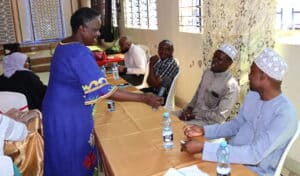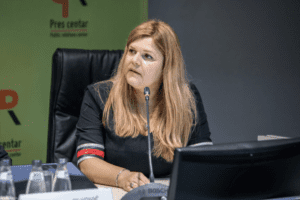
Promoting social cohesion through community dialogue

Arigatou International – End Child Poverty in collaboration with the Uzalendo Afrika Initiative and Elim Fellowship Church, Nyali – Mombasa organised a community dialogue between 28th – 29th November; bringing together over 50 diverse participants/stakeholders in the community. They included; youth, women, religious leaders and government officials. Community dialogues is a critical lifeline to promoting peace as they provide the perfect avenues for partnerships between different actors within the community.
Acknowledging that peacebuilding out- comes do not follow a linear pathway of change, the community dialogue was positioned to provide an opportunity for to not only contextualize drivers of conflict but assess the levels of conflict, review and monitor some of the emerging new dynamics around Preventing, Countering Violent Extremism (PCVE), faith, and elections.
“We need to look at Freedom of Religion or Belief (FoRB) within the context of communities. Religious leaders need to help communities in understanding and proper interpretation of religious texts” Gerald Acho, Regional Peace Programme Lead; Arigatou International – End Child Poverty. The community conversations revealed that in order to build social cohesion, some tenets towards sustainable social cohesion were identified as collaboration with different stakeholders, em- powering others to give feedback on work done on social cohesion and inclusion of leaders at different levels. While meaningful and consistent dialogue sessions were lauded as effective ways to building stronger and cohesive communities, youth and women were called upon to take up available opportunities and initiatives in communities and within government to empower themselves and help build more cohesive communities.
Read on the community dialogue
The post <strong>Promoting social cohesion through community dialogue</strong> appeared first on End Child Poverty.
The post Promoting social cohesion through community dialogue appeared first on Arigatou International.

Empowering Children with Disability in Montenegro

GNRC member Djeca Crne Gore-Children of Montenegro focuses on children and youth living with disability. Since 2016, we have provided sessions for children with psychologists, speech therapists, social workers, and personal assistants, free of charge, with support from donors. This is because it is a challenge to get experts who can work with children in areas where most people speak Albanian. Aside from the language barrier, large class sizes prevent individualized learning plans for children in public schools, raising the potential for bullying.
Despite challenges posed by COVID-19, we assisted twenty-one families whose children received daily hour-long individual treatments. We organized ten workshops with families to help them overcome stress and come to terms with their children’s unique situations. The workshops helped them establish self-care so they can be of more support to their children. The parents also learned how to play with their children and stimulate their development. Additionally, we organized training for forty teachers on how to tailor educational plans to individual children, as well as develop transitional plans for those entering secondary school.
Our future plans include building stronger connections with institutions and practitioners to better respond to needs and engaging more local authorities.
I am most grateful that our efforts are being recognized countrywide, and I feel privileged to have been awarded the Iskra Philanthropy Award, a special recognition for civic contribution to the common good.
Sabra Decević
Coordinator, GNRC Montenegro
The post <strong>Empowering Children with Disability in Montenegro</strong> appeared first on Global Network of Religions for Children.
The post Empowering Children with Disability in Montenegro appeared first on Arigatou International.

Empowering Children with Disability in Montenegro

GNRC member Djeca Crne Gore-Children of Montenegro focuses on children and youth living with disability. Since 2016, we have provided sessions for children with psychologists, speech therapists, social workers, and personal assistants, free of charge, with support from donors. This is because it is a challenge to get experts who can work with children in areas where most people speak Albanian. Aside from the language barrier, large class sizes prevent individualized learning plans for children in public schools, raising the potential for bullying.
Despite challenges posed by COVID-19, we assisted twenty-one families whose children received daily hour-long individual treatments. We organized ten workshops with families to help them overcome stress and come to terms with their children’s unique situations. The workshops helped them establish self-care so they can be of more support to their children. The parents also learned how to play with their children and stimulate their development. Additionally, we organized training for forty teachers on how to tailor educational plans to individual children, as well as develop transitional plans for those entering secondary school.
Our future plans include building stronger connections with institutions and practitioners to better respond to needs and engaging more local authorities.
I am most grateful that our efforts are being recognized countrywide, and I feel privileged to have been awarded the Iskra Philanthropy Award, a special recognition for civic contribution to the common good.
Sabra Decević
Coordinator, GNRC Montenegro
The post <strong>Empowering Children with Disability in Montenegro</strong> appeared first on Global Network of Religions for Children.
The post Empowering Children with Disability in Montenegro appeared first on Arigatou International.

Youth Responding to Climate Change in South Africa

On September 19th, 2020, GNRC South Africa launched the Zimbali Zonke Garden4Life Project at a children’s interfaith day camp. The launch owed to the run-up to the United Nations International Day of Peace. Since its launch, the project has continued to be a platform to share and take action to mitigate climate change.
South Africa is particularly vulnerable to the impacts and effects of climate change. Temperatures are rising, and rainfall is increasing yearly, causing serious problems and damage. The Sustainable Development Goals call for action to protect the planet to ensure that all people enjoy peace and prosperity. The GNRC’s mission and vision of building a better world for children include caring for our earth. We look at how we can offer balanced education to our children and youth to include care for the environment and understanding how climate change affects us. We, at GNRC South Africa, consider knowledge, understanding, and action on climate change as part of our personal commitments to protect the earth.
We commit to learning more about the impacts of climate change and understanding how we can support environmental action locally. It is with this in mind that we started a vegetable garden for our children at the World Assembly of Muslim Youth premises in 2021.
Ms. Saydoon Nisa Sayed
Coordinator, GNRC South Africa
The post Youth Responding to Climate Change in South Africa appeared first on Global Network of Religions for Children.
The post Youth Responding to Climate Change in South Africa appeared first on Arigatou International.

Youth Responding to Climate Change in South Africa

On September 19th, 2020, GNRC South Africa launched the Zimbali Zonke Garden4Life Project at a children’s interfaith day camp. The launch owed to the run-up to the United Nations International Day of Peace. Since its launch, the project has continued to be a platform to share and take action to mitigate climate change.
South Africa is particularly vulnerable to the impacts and effects of climate change. Temperatures are rising, and rainfall is increasing yearly, causing serious problems and damage. The Sustainable Development Goals call for action to protect the planet to ensure that all people enjoy peace and prosperity. The GNRC’s mission and vision of building a better world for children include caring for our earth. We look at how we can offer balanced education to our children and youth to include care for the environment and understanding how climate change affects us. We, at GNRC South Africa, consider knowledge, understanding, and action on climate change as part of our personal commitments to protect the earth.
We commit to learning more about the impacts of climate change and understanding how we can support environmental action locally. It is with this in mind that we started a vegetable garden for our children at the World Assembly of Muslim Youth premises in 2021.
Ms. Saydoon Nisa Sayed
Coordinator, GNRC South Africa
The post Youth Responding to Climate Change in South Africa appeared first on Global Network of Religions for Children.
The post Youth Responding to Climate Change in South Africa appeared first on Arigatou International.






